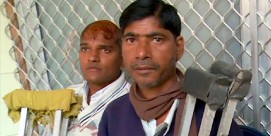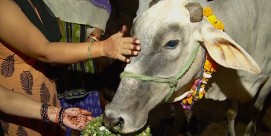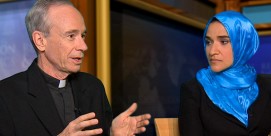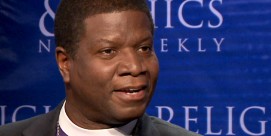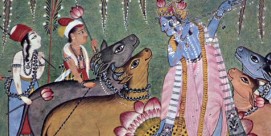In This Episode << SLIDE LEFT TO SEE ADDITIONAL SEGMENTS
Ainslee Embree and Timothy Shah Interviews
RELIGION & ETHICS NEWSWEEKLY corresponded by email with two scholars about the recent religious violence in India. Ainslie Embree is professor emeritus of history at Columbia University and an Asia expert. Timothy Shah is a research fellow at the Ethics and Public Policy Center in Washington, D.C.:
Q: Salman Rushdie recently wrote an impassioned piece of commentary about the violence in India between Hindus and Muslims. He said, among other things, that religion is “the poison in the blood” of India and that the name of the problem in India is “God.” Do you agree? Could you comment on his views about religious violence in India and your own?
AINSLIE EMBREE: The Rushdie piece is excellent, because it is written by a superb writer with a passionate concern for the fate of Muslims in India. God is the name of the problem, but of course it is not religion that is at fault, but rather the fact that religion has been used in India (as in this country) to legitimize violence and bigotry. It was not a fanatical Muslim who killed Rabin in Israel because he tried to make peace and seemed to be succeeding, but a fanatical orthodox Jew; and it was an orthodox Hindu who killed Gandhi for the same reason.
Religions believe in Truth, and if you believe that you possess the truth, then you have the right to eliminate those against that truth. (This is, after all, President Bush’s version: “They are against US.”) In India, the Hindus of Gujarat and the right-wing Hindu nationalists rarely say, however, that they speak for God. What they say is that Muslims and Christians (and liberal Hindus) pollute India with their false ideas. They go on to say that Hindus believe all religions are true, but that Muslims and Christians deny this, and therefore are false. They also say that the only true Indians are those who accept the truth of Hinduism.
None of this is very sophisticated, but it is very insidious: Muslims and Christians are not just purveyors of false ideas, they are enemies of India and traitors. It is this one hears over and over again — not so much that Hinduism is true, but that Muslims and Christians are corrupting the fabric of India with their false and foreign arguments. The Muslims are the poorest people in India, and their enemies are equally poor Hindus who see them as competitors for scarce resources.
So, Rushdie is right with his passionate statement, but it is a complex and difficult idea.
TIMOTHY SHAH: Rushdie is wrong: it is not religion in India, or the religiosity of India, that is the problem. Nor is it Hinduism or Islam as such: Hinduism has a well-deserved reputation as a tolerant faith (even if this is sometimes exaggerated; there is the caste system, after all, which obviously suggests that its tolerance and inclusiveness have definite limits), and Indian Islam is extraordinarily moderate and irenic.
Almost all of the steep escalation in religious violence in India in recent years, since the late 1980s and early 1990s in particular, has been a consequence in one way or another of the “saffron wave” — the rise of an increasingly militant Hindu nationalism. Although the Gujarat violence started with a Muslim attack on a trainload of Hindu activists, it occurred in the context of the increasing power of Hindu militants and their increasing pressure on the Indian central government to comply with a whole series of demands, particularly the immediate construction of a temple to Lord Ram in the city of Ayodhya (Ram’s supposed birthplace) in the northern state of Uttar Pradesh. Indeed, much of the violence of the last decade can be traced back to Hindu militant agitation over Ayodhya. It was in Ayodhya in December 1992 that Hindu nationalists, in an extraordinarily provocative act, demolished a mosque, the Babri Masjid, to make way for the construction of the temple to Ram. The result was terrible rioting, particularly in Mumbai (Bombay), which left more than 2,000 people dead.
It is clear from many sources, including Human Rights Watch, the British government, and the National Human Rights Commission of India, that the anti-Muslim violence in Gujarat was pre-planned and systematically executed by militant organizations that are part of the Hindu nationalist family (or sangh parivar, “family of organizations”). These organizations, particularly the Rashtriya Swayamsevak Sangh (RSS), have a paramilitary quality, and their founders openly admired modern fascist movements such as Nazism. For them, the attack on the train at Godhra was a pretext; any number of events or circumstances could have served equally well. But the particular viciousness of that attack, and the unquestionable spontaneity of some of the violence that followed, provided the perfect cover: the Hindu militants were able to conduct a systematic pogrom under the guise of a “spontaneous” communal riot.
Indeed, the fact that the grotesque religious violence in India in recent years is not merely endemic or the “natural” result of “religion,” but an organized and deliberate program of Hindu nationalists, is supported by the recent work of Ashutosh Varshney, associate professor of political science and director of the Center for South Asian Studies at the University of Michigan. Varshney has just published a searching and highly acclaimed analysis of Hindu-Muslim relations in India (ETHNIC CONFLICT AND CIVIC LIFE: HINDUS AND MUSLIMS IN INDIA, Yale University Press, 2002). Most germane to the Gujarat attacks is Varshney’s insistence that such large-scale violence (leaving, in the case of Gujarat, over 2,000 people dead, according to human rights organizations and Western diplomats) cannot result from spontaneous rioting. In the Indian cities with violent track records that Varshney studied (including Ahmedabad in Gujarat, where the worst violence occurred), “a nexus of politicians and criminals was in evidence. Without the involvement of organized gangs, large-scale rioting and tens and hundreds of killings are most unlikely, and without the protection afforded by politicians, such criminals cannot escape the clutches of the law.”
Hindu nationalists, in other words, have succeeded in visiting more and more violence on Muslims (as well as Christians, particularly in southern Gujarat), because they have been able to act with the complicity of sympathetic politicians and even governments. And they have been able to act with the most impunity in the state of Gujarat because it has a strongly Hindu-nationalist state government.
Q: What are the connections between Hindus and Muslims in the U.S. and religious violence in Gujarat?
AINSLIE EMBREE: Unfortunately, the connection is very close. Right-wing Hindus in this country have an organization they call the World Hindu Council, the translation of “Hindu Vishwa Parishad,” the extreme right-wing group that almost all Indian reporters hold responsible for the violence in Gujarat. They have the ear of many people in the U.S. Congress, because they are a wealthy, powerful group. They are skilled if crude propagandists. An example: they have permission from a Texas school district to explain in the schools why Hinduism is a religion of peace, unlike Islam. I brought this to the attention of Americana for the Separation of Church and State, but they said that when they investigated, they found that the Council just teaches that all religions are true.
TIMOTHY SHAH: One of the great untold stories about Hindu nationalism in India (though it is a story that is beginning to be told a bit more) is that it is heavily supported and funded by what are called “non-resident Indians” (NRIs) in the West, particularly in the United States. An excellent story in THE NEW YORK TIMES a couple weeks ago, by Somini Sengupta (“Hindu Nationalists Are Enrolling, and Enlisting, India’s Poor,” May 13, 2002), pointed out the strong links between Indians in the U.S. and what are in effect Hindu “madrassas” in India: Hindu-nationalist schools that provide education to poor and often tribal people, who would not otherwise be educated, but that in the process inculcate a message of hatred of so-called “foreign” religions such as Islam and Christianity. The graduates of these schools, at least in some cases, join the cadres of Hindu-nationalist organizations such as the RSS and the Bajrang Dal, the groups that helped orchestrate the attacks in Gujarat. Interestingly, as the article pointed out, for the first time the very tribal peoples of Gujarat that the Hindu nationalists are educating in their schools participated in the anti-Muslim pogrom (whereas historically they harbor no hostility whatsoever to India’s Muslims).
The last couple months have also seen something else that is very disturbing: Hindu militant groups in the United States actively seeking to deny that any serious anti-Muslim violence took place in Gujarat at all. As an Indian-American of Gujarati background who is generally very proud of the Indian-American community, I must confess that I wish I were making this up. But it often seems to be the case, as with other ethnic or religious diasporas, that non-resident Indians (the vast majority of whom are Hindus, it seems, though I don’t know the exact proportions) are more “right-wing” about Indian politics and more militantly nationalist than their average counterpart in India.


